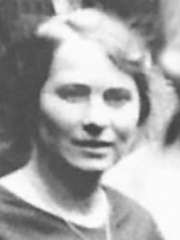
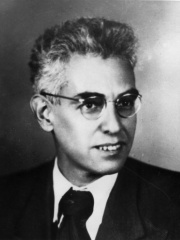
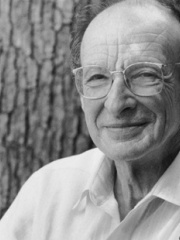
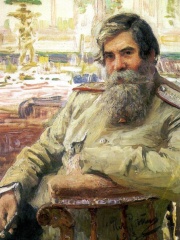
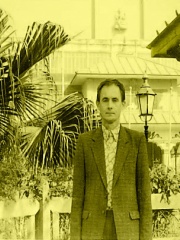



The Most Famous
PSYCHOLOGISTS from Russia
This page contains a list of the greatest Russian Psychologists. The pantheon dataset contains 235 Psychologists, 9 of which were born in Russia. This makes Russia the birth place of the 7th most number of Psychologists behind France, and Switzerland.
Top 9
The following people are considered by Pantheon to be the most legendary Russian Psychologists of all time. This list of famous Russian Psychologists is sorted by HPI (Historical Popularity Index), a metric that aggregates information on a biography's online popularity.

1. Sabina Spielrein (1885 - 1942)
With an HPI of 70.97, Sabina Spielrein is the most famous Russian Psychologist. Her biography has been translated into 36 different languages on wikipedia.
Sabina Nikolayevna Spielrein (Russian: Сабина Николаевна Шпильрейн, IPA: [sɐˈbʲinə nʲɪkɐˈlajɪvnə ʂpʲɪlʲˈrɛjn]; 7 November [O.S. 25 October] 1885 – 11 August 1942) was a Russian physician and one of the first female psychoanalysts. She was in succession the patient, then student, then colleague of Carl Gustav Jung, with whom she had an intimate relationship during 1908–1910, as is documented in their correspondence from the time and her diaries. She also met, corresponded, and had a collegial relationship with Sigmund Freud. She worked with and psychoanalysed Swiss developmental psychologist Jean Piaget. She worked as a psychiatrist, psychoanalyst, teacher and paediatrician in Switzerland and Russia. In a thirty-year professional career, she published over 35 papers in three languages (German, French and Russian), covering psychoanalysis, developmental psychology, psycholinguistics and educational psychology. Among her works in the field of psychoanalysis is the essay titled "Destruction as the Cause of Coming Into Being", written in German in 1912. Spielrein was a pioneer of psychoanalysis and one of the first to introduce the concept of the death instinct. She was one of the first psychoanalysts to conduct a case study on schizophrenia and have a dissertation appear in a psychoanalytic journal. Spielrein is increasingly recognized as an important and innovative thinker who was marginalized in history because of her unusual eclecticism, refusal to join factions, feminist approach to psychology, and her murder in the Holocaust.

2. Alexander Luria (1902 - 1977)
With an HPI of 68.51, Alexander Luria is the 2nd most famous Russian Psychologist. His biography has been translated into 38 different languages.
Alexander Romanovich Luria (; Russian: Алекса́ндр Рома́нович Лу́рия, IPA: [ˈlurʲɪjə]; 16 July 1902 – 14 August 1977) was a Soviet neuropsychologist, often credited as a father of modern neuropsychology. He developed an extensive and original battery of neuropsychological tests during his clinical work with brain-injured victims of World War II, which are still used in various forms. He made an in-depth analysis of the functioning of various brain regions and integrative processes of the brain in general. Luria's magnum opus, Higher Cortical Functions in Man (1962), is a much-used psychological textbook which has been translated into many languages and which he supplemented with The Working Brain in 1973. It is less known that Luria's main interests, before the war, were in the field of cultural and developmental research in psychology. He became famous for his studies of low-educated populations of nomadic Uzbeks in the Uzbek SSR arguing that they demonstrate different (and lower) psychological performance from their contemporaries and compatriots under the economically more developed conditions of socialist collective farming (the kolkhoz). He was one of the founders of cultural-historical psychology and a colleague of Lev Vygotsky. Apart from his work with Vygotsky, Luria is widely known for two extraordinary psychological case studies: The Mind of a Mnemonist, about Solomon Shereshevsky, who had highly advanced memory; and The Man with a Shattered World, about Lev Zasetsky, a man with a severe traumatic brain injury. During his career Luria worked in a wide range of scientific fields at such institutions as the Academy of Communist Education (1920–1930s), Experimental Defectological Institute (1920–1930s, 1950–1960s, both in Moscow), Ukrainian Psychoneurological Academy (Kharkiv, early 1930s), All-Union Institute of Experimental Medicine, and the Burdenko Institute of Neurosurgery (late 1930s). A Review of General Psychology survey, published in 2002, ranked Luria as the 69th most cited psychologist of the 20th century.

3. Urie Bronfenbrenner (1917 - 2005)
With an HPI of 66.12, Urie Bronfenbrenner is the 3rd most famous Russian Psychologist. His biography has been translated into 30 different languages.
Urie Bronfenbrenner (April 29, 1917 – September 25, 2005) was a Russian-born American psychologist best known for using a contextual framework to better understand human development. This framework, broadly referred to as 'ecological systems theory', was formalized in an article published in American Psychologist, articulated in a series of propositions and hypotheses in his most cited book, The Ecology of Human Development and further developed in The Bioecological Model of Human Development and later writings. He argued that natural experiments and applied developmental interventions provide valuable scientific opportunities. These beliefs were exemplified in his involvement in developing the US Head Start program in 1965. Bronfenbrenner's writings about the limitations of understanding child development solely from experimental laboratory research and the potential for using contextual variability to provide insight into developmental processes was important in changing the focus of developmental psychology.

4. Vladimir Bekhterev (1857 - 1927)
With an HPI of 66.03, Vladimir Bekhterev is the 4th most famous Russian Psychologist. His biography has been translated into 43 different languages.
Vladimir Mikhailovich Bekhterev (Russian: Влади́мир Миха́йлович Бе́хтерев, IPA: [ˈbʲextʲɪrʲɪf]; 20 January 1857 – 24 December 1927) was a Russian neurologist and the father of objective psychology. He is best known for noting the role of the hippocampus in memory, his study of reflexes, and Bekhterev's disease. Moreover, he is known for his competition with Ivan Pavlov regarding the study of conditioned reflexes. The sudden circumstances of his death has led to rumours that he died on the orders of Joseph Stalin. This is because Bekhterev performed a medical diagnosis of Stalin shortly before his death which was considered to be politically damaging to the position of the Soviet dictator. This remains disputed among scholars due to the lack of direct evidence.
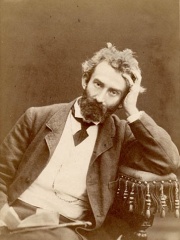
5. Nicholas Miklouho-Maclay (1846 - 1888)
With an HPI of 64.89, Nicholas Miklouho-Maclay is the 5th most famous Russian Psychologist. His biography has been translated into 38 different languages.
Nicholas or Nicholai Nikolaevich Miklouho-Maclay (Russian: Никола́й Никола́евич Миклу́хо-Макла́й; 17 [O.S. 5] July 1846 – 14 [O.S. 2] April 1888) was a Russian explorer and scientist. He worked as an ethnologist, anthropologist and biologist. He became famous as one of the earliest scientists to settle among and study indigenous people of New Guinea "who had never seen a European". Miklouho-Maclay spent the major part of his life travelling and conducted scientific research in the Middle East, Australia, New Guinea, Melanesia and Polynesia. Australia became his adopted country and Sydney the hometown of his family. He became a prominent figure of nineteenth-century Australian science and became involved in significant issues of Australian and New Guinea history. Writing letters to Australian papers, Miklouho-Maclay expressed his opposition to the labour and slave trade ("blackbirding") in Australia, New Caledonia and the Pacific, as well as his opposition to the British and German colonial expansion in New Guinea. While in Australia, he built the first biological research station in the Southern Hemisphere, was elected to the Linnean Society of New South Wales, was instrumental in establishing the Australasian Biological Association, stayed at the elite Australian Club, became the intimate of the leading amateur scientist and political figure Sir William Macleay, and married Margaret-Emma Robertson, the daughter of the Premier of New South Wales. His three grandsons have all contributed to the public life of Australia. One of the earliest followers of Charles Darwin, Miklouho-Maclay is also remembered today as a scholar who, on the basis of his comparative anatomical research, was one of the first anthropologists to refute the prevailing view that the different races of mankind belonged to different species.

6. Victor Skumin (b. 1948)
With an HPI of 60.89, Victor Skumin is the 6th most famous Russian Psychologist. His biography has been translated into 28 different languages.
Victor Andreevich Skumin (Russian: Ви́ктор Андре́евич Ску́мин, IPA: [ˈvʲiktər ɐnˈdrʲejɪvʲɪtɕ ˈskumʲɪn], born 30 August 1948) is a Russian and Soviet scientist, psychiatrist, philosopher and writer. After graduating from the Kharkiv National Medical University in 1973, he became a psychotherapist in Kiev Institute of Cardiovascular Surgery. In 1978, he described a new disease, the Skumin syndrome. He introduced a method of psychotherapy and self-improvement based on optimistic autosuggestion for psychological rehabilitation of cardiosurgical patients (1979). From 1980 to 1990, he was professor of psychotherapy at the Kharkiv Medical Academy of Post-graduate Education. The main result of his scientific activity was the discovery of the "syndrome of the neurotic phantom of somatic disease" and a "concept of the mental constituent of a chronic somatic disease". From 1990 to 1994, Skumin held positions as chaired professor of psychology and pedagogy, and of physical education and Health life at the Kharkiv State Academy of Culture. In 1994, he was elected to the post of the President-founder of the World Organisation of Culture of Health (Moscow). In 1995, Skumin became the first editor-in-chief of the journal To Health via Culture. He is known for inventing a popular term "Culture of Health" (1968). Besides psychiatry and psychology, Skumin writes on healthy lifestyle, yoga, and philosophy. He co-authored series of illustrated books and articles on Agni Yoga, Roerichism, Russian cosmism, transhumanism, and New Age. He wrote books of fiction and lyrics for several songs.

7. Aleksei N. Leontiev (1903 - 1979)
With an HPI of 60.79, Aleksei N. Leontiev is the 7th most famous Russian Psychologist. His biography has been translated into 29 different languages.
Aleksei Nikolayevich Leontiev (Russian: Алексе́й Никола́евич Лео́нтьев, IPA: [lʲɪˈonʲtʲjɪf]; February 18, 1903 – January 21, 1979), was a Soviet Russian developmental psychologist and philosopher and a founder of activity theory. He was born and died in Moscow.

8. Endel Tulving (1927 - 2023)
With an HPI of 56.38, Endel Tulving is the 8th most famous Russian Psychologist. His biography has been translated into 15 different languages.
Endel Tulving (May 26, 1927 – September 11, 2023) was an Estonian-born Canadian experimental psychologist and cognitive neuroscientist. In his research on human memory he proposed the distinction between semantic and episodic memory. Tulving was a professor at the University of Toronto. He joined the Rotman Research Institute at Baycrest Health Sciences in 1992 as the first Anne and Max Tanenbaum Chair in Cognitive Neuroscience and remained there until his retirement in 2010. In 2006, he was named an Officer of the Order of Canada (OC), Canada's highest civilian honour.

9. Natalia Bekhtereva (1924 - 2008)
With an HPI of 55.35, Natalia Bekhtereva is the 9th most famous Russian Psychologist. Her biography has been translated into 17 different languages.
Natalia Petrovna Bekhtereva (Russian: Ната́лья Петро́вна Бе́хтерева, IPA: [ˈbʲextʲɪrʲɪvə]; July 7, 1924 – June 22, 2008) was a Soviet and Russian neuroscientist and psychologist who developed neurophysiological approaches to psychology, such as measuring the impulse activity of human neurons. She was a participant in the documentaries The Call of the Abyss (Russian: Зов бездны) and Storm of Consciousness (Russian: Штурм сознания), which aroused wide public interest.
People
Pantheon has 9 people classified as Russian psychologists born between 1846 and 1948. Of these 9, 1 (11.11%) of them are still alive today. The most famous living Russian psychologists include Victor Skumin. The most famous deceased Russian psychologists include Sabina Spielrein, Alexander Luria, and Urie Bronfenbrenner.
Living Russian Psychologists
Go to all RankingsDeceased Russian Psychologists
Go to all RankingsSabina Spielrein
1885 - 1942
HPI: 70.97
Alexander Luria
1902 - 1977
HPI: 68.51
Urie Bronfenbrenner
1917 - 2005
HPI: 66.12
Vladimir Bekhterev
1857 - 1927
HPI: 66.03
Nicholas Miklouho-Maclay
1846 - 1888
HPI: 64.89
Aleksei N. Leontiev
1903 - 1979
HPI: 60.79
Endel Tulving
1927 - 2023
HPI: 56.38
Natalia Bekhtereva
1924 - 2008
HPI: 55.35
Overlapping Lives
Which Psychologists were alive at the same time? This visualization shows the lifespans of the 8 most globally memorable Psychologists since 1700.

